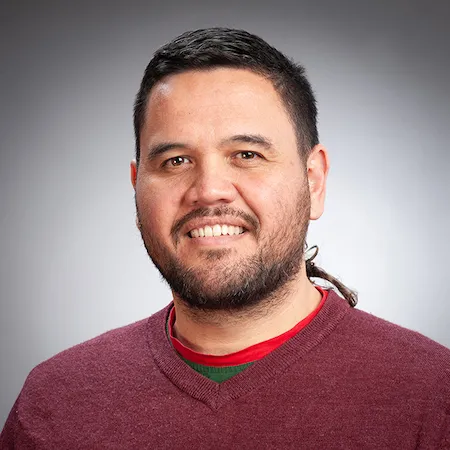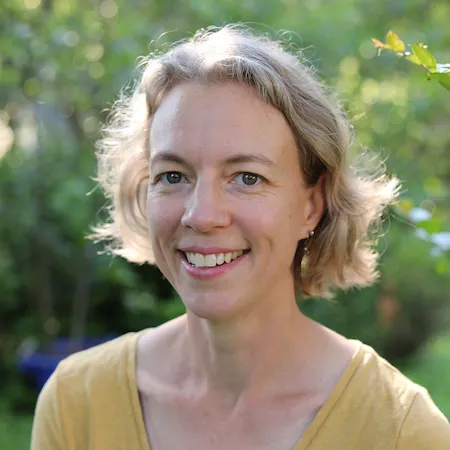In this video, SESYNC’s Dr. Heidi Scott speaks with Dr. Billy van Uitregt, a senior lecturer in the School of Geography, Environment and Earth Sciences at Victoria University of Wellington, Te Herenga Waka. Dr. van Uitregt, who is of Māori descent, provides his perspective on the integration of Indigenous knowledge, values, and worldviews into Western science and current environmental management practices. In particular, Dr. van Uitregt discusses the relationship of Māori concepts—such as mauri (roughly translated to life force); wairua (spirit or soul); and mana (power)—to the experience and conservation of the natural world.
-
About the Presenters
Heidi Scott
Communications AssociateDr. Heidi Scott was a Communications Associate who developed educational tools for SESYNC from 2022 to 2024. She taught at the University of Maryland as a Senior Lecturer in English and Assistant Clinical Professor (2019–2022) in University Honors, where she won an Impact and Innovation Teaching Award for the course Ecology of Identity (2022).
Her books, Chaos and Cosmos (2014) and Fuel: An Ecocritical History (2018), take epistemological and historical approaches to ecology that bridge the humanities and sciences. Her work centers on microcosm models in poetry and empirical science, narrative...
Heidi Scott
Communications AssociateDr. Heidi Scott was a Communications Associate who developed educational tools for SESYNC from 2022 to 2024. She taught at the University of Maryland as a Senior Lecturer in English and Assistant Clinical Professor (2019–2022) in University Honors, where she won an Impact and Innovation Teaching Award for the course Ecology of Identity (2022).
Her books, Chaos and Cosmos (2014) and Fuel: An Ecocritical History (2018), take epistemological and historical approaches to ecology that bridge the humanities and sciences. Her work centers on microcosm models in poetry and empirical science, narrative meaning in eras of rupture and rapid change, and the literature of energy, especially petroculture versus renewable sources and their cultural and ontological effects.
Her recent creative work has turned to filmmaking. She wrote and directed the short film Landfill (2020), which imagines our 22nd century descendants digging down through the plastic “fossils” of our consume-and-waste culture, set against a futurist society designed around biomimicry and interspecies equality. Part satire, part eco-social vision, the film appeared locally in FilmFest DC (2021) and the Wheaton Film Festival (2021).
Heidi creates pedagogy that integrates human and social insights with bioscience to elucidate how our view of nature has been the co-creation of cultural, economic, and scientific perspectives. She employs several emotional, tonal, and creative registers to blaze a solutions-based path forward.
Heidi earned a PhD and MA in Literature from the University of Maryland and a BS in Biology from the University of North Carolina. She serves on the Executive Council of the Association for the Study of Literature and the Environment (ASLE).
External Link:
https://umcp.academia.edu/HeidiScottImage
Billy van Uitregt
Dr. Billy van Uitregt is a senior lecturer in the School of Geography, Environment and Earth Sciences at the Victoria University of Wellington, Te Herenga Waka, New Zealand. Born and raised in Australia, Billy earned a PhD in Evolutionary Ecology, a graduate certificate in International Relations, and a master's degree in Indigenous Studies. Billy, who is of Māori and Dutch descent, focuses much of his work on integrating Indigenous perspectives into environmental and conservation programs and policies.
Image
Billy van Uitregt
Dr. Billy van Uitregt is a senior lecturer in the School of Geography, Environment and Earth Sciences at the Victoria University of Wellington, Te Herenga Waka, New Zealand. Born and raised in Australia, Billy earned a PhD in Evolutionary Ecology, a graduate certificate in International Relations, and a master's degree in Indigenous Studies. Billy, who is of Māori and Dutch descent, focuses much of his work on integrating Indigenous perspectives into environmental and conservation programs and policies.
